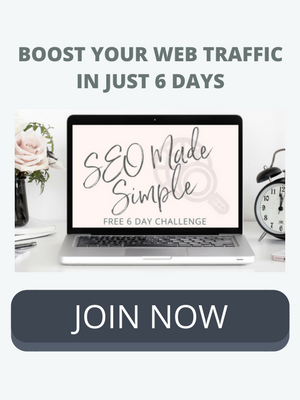How to Build a SAAS Business From Concept to Reality (the Designsta Way)
/Louise Clark founded Designsta* in 2015 and, not long after, I heard many people raving about it in the Female Entrepreneur Association Members’ Club!
Designsta is a fantastic, easy-to-use, custom-built graphic design platform that enables you to design your own graphics. Louise is a designer herself and she also works with artists and photographers, like Haute Stock* styled stock extraordinaire photographer Rachel Rouhana.
Every month new collections of hand-painted design elements are released. With hundreds of pre-designed templates and 4000+ elements, Designsta has all your design needs covered. From infographics to printables to workbooks to social media picture quotes (in your brand colours, of course), Designsta is built with small business owners, bloggers and solopreneurs in mind. Pricing starts at free, then: $7 for a 24hr pass / $9.99 per month / VIP $25 per month - find out more.*
Read on for Louise’s startup story and how she fell into tech and built her SAAS (Software As A Service) business. And, at the end of the post, don’t miss her great tips for building a tech company which can really apply to building any business.
Would you believe me if I told you Designsta came about by accident?!
Let’s rewind three years.
I’d just moved from the UK to San Francisco with my boyfriend (now husband - yes, a lot has changed in three years!) and I wanted something new to sink my teeth into.
I’ve always been entrepreneurial and I’ve always loved a project - some of them have been quite ridiculous!
Okay, okay, I know you want the goss…
I ran a local magazine for a year both printed and online.
I’ve written, illustrated and self published a children’s book called Monty Moon - I Could Keep The Moon in my Pocket
I ran a womens poker site where I interviewed famous female poker players and shared poker tips but I gave that up because I just didn't know enough about poker lol!
I’ve sold products on Amazon.
And... I’ve been in a burlesque girl band (no nakedness was involved thankfully!)
Fast forward to 2015, I’d been running my own freelance graphic design business for 5 years and, to be honest, I’d grown tired of it. It no longer made my heart sing. I knew I wanted a change but deciding exactly what that change would be… well, that’d troubled me for quite some time.
Your surroundings can have a huge influence on your business
Finding myself suddenly living in the technology capital of the world definitely had a part to play in what was to come. Our apartment overlooked the Twitter building and there were tech startups all around us. I’d never worked in tech before and I can’t code! But I was inspired.
At that time, I’d just launched an e-commerce store selling my illustrated postcards. It was more of a hobby alongside my design business. I decided I wanted to find a way for customers to be able to edit my postcards on the website and add in their own personal messages, so I set about searching for a simple (hopefully free) Wordpress plugin that would help me achieve this function…or so I thought.
How naive!
When I began the researching, I was hanging out in lots of business Facebook groups. I realized so many small business owners were doing their own graphic design because huge numbers of people were sharing their DIY designs in these groups for feedback.
It’s one thing getting feedback from professional designers or artists, but quite another to ask fellow business owners with their different tastes, preferences and, let’s be frank, lack of professional design experience!
So I started giving feedback and suggestions and started to think about how I could help people produce more professional-looking designs and feel more confident in their own abilities.
There were two questions I had to ask myself over and over:
What problems could I solve for others?
What problems could I solve for myself?
I had to continually make sure the answers were aligned. It was vital that I didn’t end up in a position of providing something of limited value &/or where I was unhappy.
Searching for an innovative tech company that was the right fit for Designsta
After my search for the perfect plugin for my illustrated postcards failed, but my new, half-formed idea of what would become Designsta* was growing.
I started contacting different development companies and soon realized the scope was huge!
Although it was daunting, I started to feel inspired and wanted to learn as much as possible about developing something unique that people could use to design their own graphics. I felt like there was definitely room for another design platform and wanted to offer one that came with plenty of support for users.
After what seemed like forever, I found my developers.
Before I knew it, I was having nightly Skype calls to India where they’re based. Because I was in San Francisco, I was having to schedule calls at midnight my time so that it could be during their working hours.
I look back and laugh because I’ve got such a great working relationship with the team now but there were so many language barriers and confusing moments where we weren’t quite getting each other. At first it was very daunting and I kept thinking - what the heck am I doing talking to these guys in India every night?!
Developing a partnership and launching - teething pains & lessons learned
But I kept my faith and my amazing developers got to work. After lots of back and forth - going through amends and customisations to the platform itself, it was time for me to begin stocking-up the site with templates and design elements.
I can only describe myself as a crazy professor with steam coming out of my ears during this period! I didn’t leave my office in our apartment and worked so late into the night only dragging myself away from my computer to crawl into bed.
As it turned out, I only had one month to stock the site with templates and design elements. But this was due to the ridiculous deadline I’d given myself - in hindsight I would’ve definitely given myself an extension.
I also gave myself repetitive strain injury and had to wear a massive wrist support because I was just spending every hour building templates. “Oops!” is putting it mildly.
I did an incredibly soft launch when I first put Designsta to market. This was because I was still working on the product and I wanted to test the waters and see what the response was like from users. So, I had a group of 20 beta testers who I gave free membership to in exchange for their honest feedback and the hope that they would promote Designsta to their audience.
Getting where I am today - marketing and teamwork
Fast forward to today and I market Designsta in many ways, but my main success has come from Facebook ads. I have a wonderful lady who runs my ads for me and, because I’m selling a low priced product, the ads work really well going straight to my sales page.
I also have a lead magnet (aka freebie) which I run ads to. When you sign-up, it’s followed by a funnel of video tutorials which shows how Designsta can be used to create social media graphics. I also post regular content on my Facebook page, Instagram profile and on Pinterest. I’ve found Pinterest to be a great source of traffic - because Designsta is so visual and Pinterest is the perfect platform for sharing gorgeous, eye-catching images.
Since I first launched Designsta it has come a long way. There has been A LOT of customization to the site from the very first version we developed. I’m very much about the product and I always have so many ideas on how it could be even better.

Listening to your audience
It was essential to pay attention to how my early adopters were using the site, what they were creating and what could make the experience better and easier for them.
Since I first launched Designsta, I’ve run a Facebook Group alongside the platform where I offer help, support and feedback to all users. This has been such a great resource for me, as well as the users, because it means I get to hear from the members and understand:
What they like
What they don’t like
What they really want
There are now over 4,000 design elements and 1,000+ pre-designed templates in Designsta!
I’ve continued to add new features within the platform and Designsta is now available on mobile too, so users can design on their phone, save straight to their camera roll and upload to their social media accounts. We also release a monthly bundle of hand-painted design elements created in-house by my sister, who is a very talented artist and now works full time for Designsta. And we’ve just launched a FREE version of Designsta* (so all of the square social media templates are free).
Tips for growing a customer-focused (tech) business
To run a SAAS (Software As A Service) business it takes quite a thick skin and lots of determination.
I’ve found you’ve got to be ready to adapt and listen to what people want. You also have to stay calm when technology breaks, which unfortunately does happen occasionally - it’s the same for all technology-based businesses.
Having great customer service and a good rapport with users is so important, plus keeping people in the loop with what you are doing. If there ever is an issue with something, as long as people realize you’re on the case and working to get it sorted, you’ll normally be met with understanding and kindness.
Ultimately, having a strong vision for what you want to create and being an ideas person is important, so that you can do justice to your dreams.
About Louise Clark
Louise is the founder of Designsta.com*, the online design platform for entrepreneurs, bloggers and creatives. Designsta was born out of Louise's frustration for the lack of tools and support available to the number of entrepreneurs looking to create visual content to take advantage of the rise of social media. In an increasingly connected world, bringing your brand to life is imperative.
Prior to Designsta, Louise had a successful career running her own graphic design business working with some of the world’s best loved brands.
Proving that entrepreneurs really can create awesome design on the move, Louise can often be found creating templates for Designsta on transatlantic wifi as she divides her time between San Francisco and Newcastle-upon-Tyne.
*Affiliate link: I only use affiliate programs for products and services I know and trust.




















